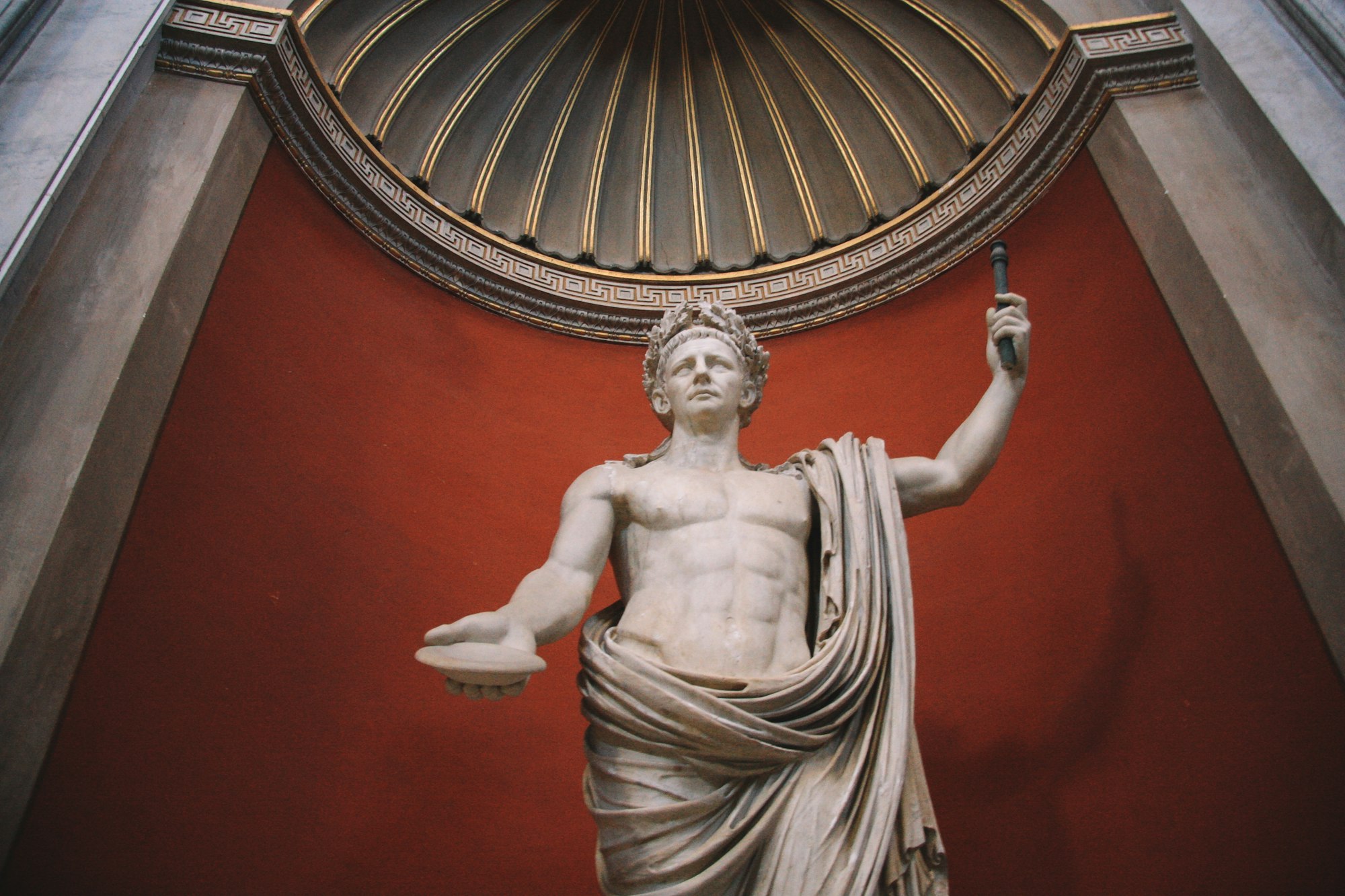It is no secret that the Roman Republic had a great effect upon the world we know today.
While many great names arose from it, Augustus Caesar shaped Rome into the empire we now think of. His unlikely rise to power and successful career as the first emperor of Rome has made him one of the most famous, and perhaps interesting, men of history.
While we now know him as Augustus, his family and friends would have called him Octavian when he was born on September 23, 63 BC. His father, Gaius Octavius, was a successful merchant and investor in agricultural business. He was wealthy and strived for political success, but it was his marriage to Atia, niece of the great Julius Caesar, that brought him Roman nobility. While he seemed destined for political leadership, Gaius died suddenly in 58 BC, leaving his wife a widow and his five-year-old son fatherless. Atia eventually remarried to Lucius Marcius Philippus. (Strauss 8; Grabsky 60; Suetonius VIII)
As a young boy, Augustus was diligent in his studies, taking on subjects such as Greek, Latin, rhetoric, and philosophy under his Greek tutor Apollodorus of Pergamum. His skill as a speaker became evident upon the death of his grandmother, Julia. Being close to her, twelve- year-old Augustus gave a ceremonious oration at her funeral that friends, nobles, and even Julius Caesar would have witnessed. (Grabsky 60; Suetonius VIII)
When he was older, Augustus desired action and sought to join Julius Caesar in his military conquests. At age seventeen he traveled to Spain to join him in pursuit of General Pompey’s sons, even though he was recovering from sickness. It was during this journey that he was shipwrecked in enemy territory. Seeing his character through these events, Julius Caesar thought very highly of him and sent Augustus east of the Adriatic to prepare a campaign against the Parthians. (Suetonius VIII; Grabsky 61)
This campaign did not take place, however, as it was while he was there that Augustus learned of Caesar’s murder and discovered, to his surprise, that he been declared Caesar’s heir in his will. (Grabsky 61)
Mark Antony was convinced he deserved to assume Julius Caesar’s position and accused Augustus of achieving his adoption through an affair with Julius Caesar. Augustus’ stepfather, Philippus, advised him to decline the legacy and keep his own name for fear of a confrontation with Antony, (Goldsworthy 88) but a nineteen-year-old Augustus eventually decided against this advice and went to Rome to raise a private army with his own funds. While there, he accepted the adoption and was renamed Gaius Julius Caesar Octavianus. (Strauss 15; Grabsky 61)
This private army was comprised of loyal and experienced veterans who served under Augustus’ great-uncle Julius Caesar. The Roman senate took advantage of this powerful military and declared war on Antony, sending Augustus and the two newly appointed consuls to confront him. Augustus prevailed in the two battles that followed, but the Roman consuls were both killed. (Potter)
With Antony in retreat and the consuls out of the way, Augustus chose to march upon Rome and demand consulship from the senate. Suetonius wrote that “He was advanced to public offices before the age at which he was legally qualified for them; and to some, also, of a new kind, and for life. He seized the consulship in the twentieth year of his age, quartering his legions in a threatening manner near the city, and sending deputies to demand it for him in the name of the army. When the senate demurred, a centurion, named Cornelius, who was at the head of the chief deputation, throwing back his cloak, and shewing the hilt of his sword, had the presumption to say in the senate-house, ‘This will make him consul, if ye will not.’” (Suetonius XXVI)
Now in a position of power, Augustus made an alliance with Antony and Lepidus, a powerful general and comrade of Caesar. Together they became a three-man dictatorship and began to take revenge upon their former opposition and Caesar’s assassins. To seal this alliance, Antony married Augustus’ sister, Octavia. (Grabsky 64)
It was not long before rifts once more began to grow between the three dictators. Lepidus had grown power hungry in North Africa, and Mark Antony insulted Octavia and turned to the Egyptian queen Cleopatra. Lepidus’ men were quick to abandon him and join Augustus’ amassing force. Having this further encouragement of victory, Augustus forced the Senate’s hand and was made sole dictator of Rome. In shame and fear, Antony committed suicide. (Grabsky 67-70)
While this was just the beginning of Augustus’ long rule until his death in AD 14, it was what set him up for the continued success he had throughout his life. He was known for a time of peace through forceful means. Along with the title Augustus, or exalted one, he began to assume the name divi filius, son of a god. This was due to Julius Caesar’s title of divus lulius, the divine Julius. (Everitt 85)
It is a stark contrast that we see between this proud and mighty savior of Rome and Jesus Christ, the ultimate savior, the true mashiach, or anointed one, and the son of God, yet Caesar was a necessary component to God’s sovereign plan and very evident in the culture Jesus was exposed to.
It is worth mention that Herod the Great was a strong supporter of Mark Antony. Upon Antony’s defeat, Herod rightly became nervous and sought to win Augustus’ favor through gifts and flattery. One way of doing this was through the renaming of Caesarea Maritima to include Augustus’ family name. (Goldsworthy 209; 294) It is safe to say that without Augustus’ pardon and trust, Herod’s own part in Christ’s life would be impossible.
Yet without Augustus, there would be an even more significant obstacle to the prophecy of Jesus’ birth. Scripture says, “But you, O Bethlehem Ephrathah, who are too little to be among the clans of Judah, from you shall come forth for me who is to be ruler in Israel, whose coming forth is from of old, from ancient days.” (The English Standard Version Bible, Micah 5.2) Because Mary and Joseph lived in Nazareth, a city of Galilee, (Luke 1.26) it would seem that this piece of the prophecy would remain unfulfilled, but Luke continues the story and says that “In those days a decree went out from Caesar Augustus that all the world should be registered. This was the first registration when Quirinius was governor of Syria. And all went to be registered, each to his own town. And Joseph also went up from Galilee, from the town of Nazareth, to Judea, to the city of David, which is called Bethlehem, because he was of the house and lineage of David.” (Luke 2.1-4) Here we see that it was Caesar Augustus himself that decreed that a census1 should take place. Without such a decree, Mary and Joseph never would have gone to Bethlehem.
This may not be Caesar’s only mention in Scripture, however. Later in life, Jesus was famously confronted concerning the issue of paying taxes to Caesar.
Then the Pharisees went and plotted how to entangle him in his words. And they sent their disciples to him, along with the Herodians, saying, “Teacher, we know that you are true and teach the way of God truthfully, and you do not care about anyone's opinion, for you are not swayed by appearances. Tell us, then, what you think. Is it lawful to pay taxes to Caesar, or not?” But Jesus, aware of their malice, said, “Why put me to the test, you hypocrites? Show me the coin for the tax.” And they brought him a denarius. And Jesus said to them, “Whose likeness and inscription is this?” They said, “Caesar's.” Then he said to them, “Therefore render to Caesar the things that are Caesar's, and to God the things that are God's.” When they heard it, they marveled. And they left him and went away. (Matthew 22.15-22)
Though after his death, it is more than likely that the image upon this coin was that of Augustus Caesar. Not only was his name associated with power and supremacy throughout the land, but he oversaw the circulation of much currency throughout his reign. (Goldsworthy 287)
This would not be the case, however, when the Jews said “If you release this man, you are not Caesar's friend. Everyone who makes himself a king opposes Caesar.” (John 19.12) and then again “We have no king but Caesar.” (John 19.15) Since Augustus had died in AD 14, they would be referring to his stepson, Tiberius Julius Caesar.
Though Augustus is rarely mentioned in Scripture, his cultural influence is evident, and his power was clearly known. In this context, I think it is interesting to contemplate the book of Romans. Though written many years after his death, Paul is addressing a culture that was drastically changed by a single unlikely dictator.
It is no doubt that Augustus Caesar was one of the most influential people of history. His fame has touched the ends of the earth, and his achievements mark the course of history, yet his greatest accomplishment was calling for a census.
Note
- This census seems to provide a significant historical issue. Quirinius did not become governor of Syria until 6-7 B.C. There are several theories presented to solve this issue, see Habermas et al.; Martin; Write.
Works Cited
Strauss, Barry. Ten Caesars: Roman Emperors from Augustus to Constantine. Simon & Schuster, 2019.
Grabsky, Phil. I, Caesar: Ruling the Roman Empire. BBC Books, 1997.
Suetonius. De Vita Caesarum. Translated by Alexander Thomas. Simon & Brown, 2013.
Potter, David. "Augustus." The Anchor Yale Bible Dictionary. Yale University Press, 2007.
Goldsworth, Adrian. Augustus: First Emperor of Rome. Yale University Press, 2014.
Everitt, Anthony. The Life of Rome’s First Emperor: Augustus. Random House, 2006.
The English Standard Version Bible. Reformation Trust Publishing, 2015.
Habermas, Gary, and Doig, Kenneh, and Bucher, Richard, and Ankerberg John. The First Census and Quirinius (Luke 2.2). http://www3.telus.net/trbrooks/firstcensus.htm. Accessed 20 October 2019.
Martin, Ernest L. The Census of Quirinius. http://www.askelm.com/star/star014.htm. Accessed 20 October 2019.
Wright, Ted. Was there really a census during the time of Caesar Augustus? www.crossexamined.org/really-census-time-caesar-augustus. Accessed 20 October 2019.

